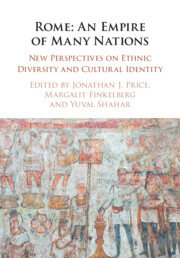Figures
4.1Tombstone of Gaius Julius Gaetulus / Keti son of Maswalat.
16.1Legio-Kefar ‘Othnay and the sites in Palestine that mention Roman military presence, Roman roads and the activities of the soldiers of Legio II Traiana and Legio VI Ferrata.
16.2Peutinger Map – Capercotani (Legio) along the Roman road between Caesarea and Bet She‘an-Scythopolis.
16.3Sites in the Jezreel Valley and its environs showing connections to Legio, according to Eusebius.
16.4Schumacher map (1908), probes and archaeological excavations at Legio.
16.5Tile bearing the stamp of Legio II Traiana, from Legio-Kefar ‘Othnay.
16.7Legio, Coin with two countermarks, the first of Legio VI Ferrata, the second of a head facing right.
16.9Kefar ‘Othnay – the northern panel of the mosaic in the Christian Prayer Hall.
17.1The camp of the X Fretensis, the Temple Mount, and the bridge connecting them in the early second century CE.
17.2The city of Aelia Capitolina and the military camp in the second and third centuries CE.
17.6Eastern Cardo in the Western Wall Plaza, looking northeast.
17.7Eastern Cardo in the Western Wall Plaza, looking southwest.
17.10Proposed reconstruction of the military camp, the ruins of the Temple Mount and the bridge connecting them in the early second century CE.

